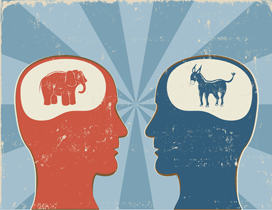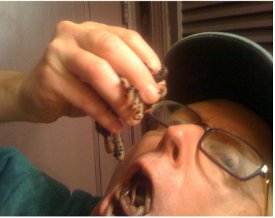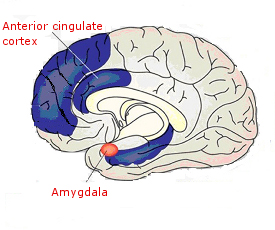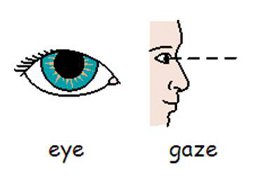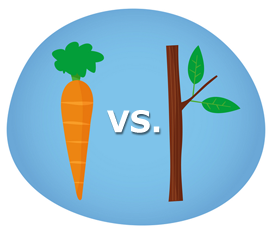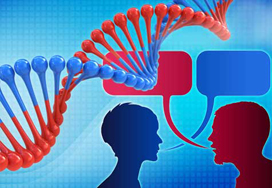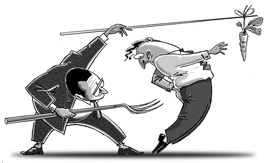TinyBubbles
anarchist
- MBTI
- ^.^
- Enneagram
- .
Found this article about the differences between conservative and liberal brains, implying that political beliefs stem from biological differences. I don't know how true it is but I thought it was worth sharing. Opinions?
Differences in Conservative and Liberal Brains
16 peer-reviewed studies show liberals and conservatives physiologically different
[TABLE="width: 98%, align: center"]
[TR]
[TD]In the 16 peer-reviewed scientific studies summarized below, researchers found that liberals and conservatives have different brain structures, different physiological responses to stimuli, and activate different neural mechanisms when confronted with similar situations. Each entry below cites the source document. The studies are arranged from most recent to oldest. We included all the peer-reviewed studies on this subject that we could find. If you know about others, please contact us with details.[/TD]
[/TR]
[/TABLE]
[TABLE="width: 98%, align: center"]
[TR]
[TD]1. People right-of-center politically spend more time looking at unpleasant images, and people left-of-center politically spend more time looking at pleasant images. [TABLE="width: 100%"]
[TR]
[TD]"We report evidence that individual-level variation in people's physiological and attentional responses to aversive and appetitive stimuli are correlated with broad political orientations. Specifically, we find that greater orientation to aversive stimuli tends to be associated with right-of-centre and greater orientation to appetitive (pleasing) stimuli with left-of-centre political inclinations."
Michael D. Dodd, PhD, Amanda Balzer, PhD, Carly Jacobs, MA, Michael Gruszczynski, MA, Kevin B. Smith, PhD, and John R. Hibbing, PhD, "The Left Rolls with the Good; The Right Confronts the Bad. Physiology and Cognition in Politics,"[/TD]Philosophical Transactions of the Royal Society B: Biological Sciences, Mar. 5, 2012
[/TR]
[/TABLE]
[/TD]
[/TR]
[/TABLE]
[TABLE="width: 98%, align: center"]
[TR]
[TD]2. Reliance on quick, efficient, and "low effort" thought processes yields conservative ideologies, while effortful and deliberate reasoning yields liberal ideologies. [TABLE="width: 100%"]
[TR]
[TD]"...[P]olitical conservatism is promoted when people rely on low-effort thinking. When effortful, deliberate responding is disrupted or disengaged, thought processes become quick and efficient; these conditions promote conservative ideology… low-effort thought might promote political conservatism because its concepts are easier to process, and processing fluency increases attitude endorsement.
Four studies support our assertion that low-effort thinking promotes political conservatism... Our findings suggest that conservative ways of thinking are basic, normal, and perhaps natural."Scott Eidelman, PhD, Christian S. Crandall, PhD, Jeffrey A. Goodman, PhD, and John C. Blanchar, "Low-Effort Thought Promotes Political Conservatism," Society for Personality and Social Psychology, 2012[/TD]
[/TR]
[/TABLE]
[/TD]
[/TR]
[/TABLE]
[TABLE="width: 98%, align: center"]
[TR]
[TD]3. People who react strongly to disgusting images, such as a picture of someone eating worms, are more likely to self-identify as conservative. [TABLE="width: 100%"]
[TR]
[TD]"People who believe they would be bothered by a range of hypothetical disgusting situations display an increased likelihood of displaying right-of-center rather than left-of-center political orientations… In this article, we demonstrate that individuals with marked involuntary physiological responses to disgusting images [measured by change in mean skin conductance], such as of a man eating a large mouthful of writhing worms, are more likely to self-identify as conservative and, especially, to oppose gay marriage than are individuals with more muted physiological responses to the same images." Kevin B. Smith, PhD, Douglas Oxley, PhD, Matthew V. Hibbing, PhD, John R. Alford, PhD, and John R. Hibbing, PhD, "Disgust Sensitivity and the Neurophysiology of Left-Right Political Orientations,"[/TD]PLOS ONE, Oct. 19, 2011
Kevin B. Smith, PhD, Douglas Oxley, PhD, Matthew V. Hibbing, PhD, John R. Alford, PhD, and John R. Hibbing, PhD, "Disgust Sensitivity and the Neurophysiology of Left-Right Political Orientations,"[/TD]PLOS ONE, Oct. 19, 2011
[/TR]
[/TABLE]
[/TD]
[/TR]
[/TABLE]
[TABLE="width: 98%, align: center"]
[TR]
[TD]4. Liberals have more tolerance to uncertainty (bigger anterior cingulate cortex), and conservatives have more sensitivity to fear (bigger right amygdala). [TABLE="width: 100%"]
[TR]
[TD]"In a large sample of young adults, we related self-reported political attitudes to gray matter volume using structural MRI [magnetic resonance imaging]. We found that greater liberalism was associated with increased gray matter volume in the anterior cingulate cortex, whereas greater conservatism was associated with increased volume of the right amygdala...
...[O]ur findings are consistent with the proposal that political orientation is associated with psychological processes for managing fear and uncertainty. The amygdala has many functions, including fear processing. Individuals with a larger amygdala are more sensitive to fear, which, taken together with our findings, might suggest the testable hypothesis that individuals with larger amagdala are more inclined to integrate conservative views into their belief systems... our finding of an association between anterior cingulate cortex [ACC] may be linked with tolerance to uncertainty. One of the functions of the anterior cingulate cortex is to monitor uncertainty and conflicts. Thus it is conceivable that individuals with a larger ACC have a higher capacity to tolerate uncertainty and conflicts, allowing them to accept more liberal views."
Ryota Kanai, PhD, Tom Feilden, Colin Firth, and Geraint Rees, PhD, "Political Orientations Are Correlated with Brain Structure in Young Adults,"[/TD]Current Biology, Apr. 7, 2011
[/TR]
[/TABLE]
[/TD]
[/TR]
[/TABLE]
[TABLE="width: 98%, align: center"]
[TR]
[TD]5. Conservatives have stronger motivations than liberals to preserve purity and cleanliness. [TABLE="width: 100%"]
[TR]
[TD]"...[R]eminders of physical purity influence specific moral judgments regarding behaviors in the sexual domain as well as broad political attitudes...
...[E]nvironmental reminders of physical cleanliness shifted participants’ attitudes toward the conservative end of the political spectrum and altered their specific attitudes toward various moral acts...
Conservatives show a stronger tendency than liberals to feel disgust and find specific violations of sexual purity more offensive... When taken together, these two sets of results point to the possibility that political orientation may be, in some measure, shaped by the strength of an individual’s motivation to avoid physical contamination and that resulting vigilance for threats to purity may serve to reinforce a politically conservative stance toward the world."
Erik G. Helzer and David A. Pizarro, PhD, "Dirty Liberals! Reminders of Physical Cleanliness Influence Moral and Political Attitudes," Psychological Science, Mar. 18, 2011[/TD]
[/TR]
[/TABLE]
[/TD]
[/TR]
[/TABLE]
[TABLE="width: 98%, align: center"]
[TR]
[TD]6. Liberals are more likely than conservatives to shift their attention in the direction of another person's gaze. [TABLE="width: 100%"]
[TR]
[TD]"In the present study, we examine whether gaze cue effects [shifting ones attention in the direction of another's gaze] are moderated by political temperament, given that those on the political right tend to be more supportive of individualism–and less likely to be influenced by others–than those on the left. We find standard gaze cuing effects across all subjects, but systematic differences in these effects by political temperament. Liberals exhibit a very large gaze cuing effect while conservatives show no such effect at various SOAs [stimulus onset asynchrony]... Perhaps conservatives are less likely to trust others meaning that they are also less likely to trust a gaze cue..."
Michael D. Dodd, PhD, John R. Hibbing, PhD, and Kevin B. Smith, PhD, "The Politics of Attention: Gaze Cuing Effects Are Moderated by Political Temperament," Attention, Perception & Psychophysics, Jan. 2011[/TD]
[/TR]
[/TABLE]
[/TD]
[/TR]
[/TABLE]
[TABLE="width: 98%, align: center"]
[TR]
[TD]7. Republicans are more likely than Democrats to interpret faces as threatening and expressing dominant emotions, while Democrats show greater emotional distress and lower life satisfaction. [TABLE="width: 100%"]
[TR]
[TD]"Independent sample t-tests revealed group differences in the averaged threat interpretation scores of the 10 facial stimuli. Republican sympathizers were more likely to interpret the faces as signaling a threatening expression as compared to Democrat sympathizers. Group differences were also found for dominance perceptions, whereby Republican sympathizers were more likely to perceive the faces as expressing dominant emotions than were Democrat sympathizers...
Collectively, when compared to Republican sympathizers, Democrat sympathizers showed greater psychological distress, more frequent histories of adverse life events such as interpersonal victimization experiences, fewer and less satisfying relationships, and lower perceptions of the trustworthiness of peers and intimate affiliates."Jacob M. Vigil, PhD, "Political Leanings Vary with Facial Expression Processing and Psychosocial Functioning," Group Processes & Intergroup Relations, 2010[/TD]
[/TR]
[/TABLE]
[/TD]
[/TR]
[/TABLE]



